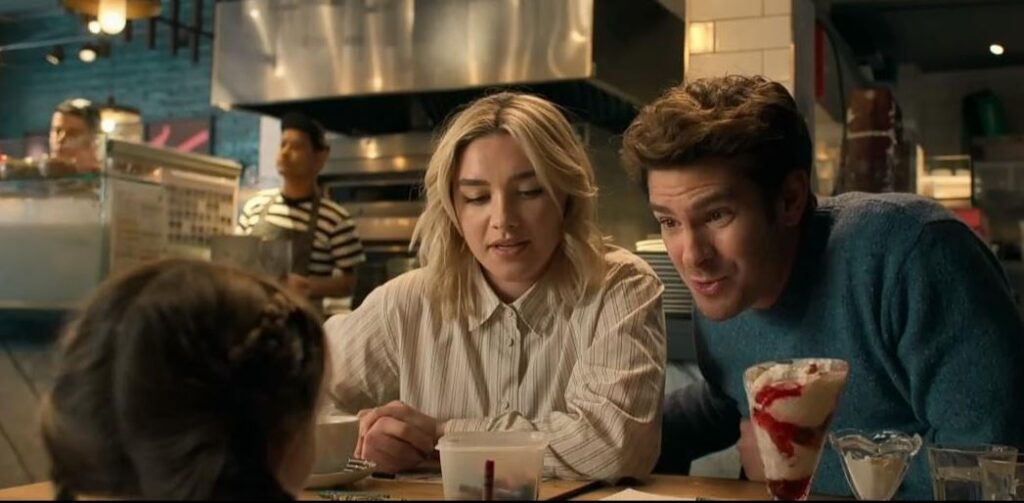
Emotional Symmetry
I don’t know how many horror movies I will see by the end of the year (four so far), but I’m certain We Live in Time will be the scariest movie I see all year. I’m not confused – We Live in Time is not a horror movie, it’s a romantic drama. But I can’t think of anything more terrifying than my wife being diagnosed with cancer…twice.
I realize that sounds bleak and not like a fun time at the theater, but rest assured that the movie is not a depressing tearjerker. I mean, it is a tearjerker, but almost always in happy ways.
We Live in Time shows us the story of Almut’s (Florence Pugh) and Tobias’ (Andrew Garfield) relationship. For those of you that like your stories linear, this is not the film for you. The story is presented to us in three timelines, jumping back and forth between the timelines throughout the film. Like an episode of Lost, but without polar bears and smoke monsters.
When Tobias and Almut first meet, Tobias is a breakfast cereal representative about to be divorced and Almut is a chef about to open her own restaurant. Their relationship starts in typical fashion – meet-cute, a couple of dates, sex. The intent is to show they are regular people and relatable, which helps the emotional scenes to land with the audience.
Meanwhile, in the second timeline, Almut is pregnant and Tobias is meticulously journaling every detail. I admit the journaling isn’t very relatable for most of us, but the pregnancy part is. My favorite scene in the movie is the montage of them trying to get pregnant, including showing their reaction to every failed pregnancy test. I remember feeling that disappointment, though we didn’t have nearly so many failures as Almut and Tobias. And we certainly didn’t have the bonus pressure of Almut rejecting a hysterectomy and beating ovarian cancer to risk having a kid. But I also shared their joy and excitement at the eventual positive test, a scene that had me shedding those tears of joy.

But it’s not all fun and games in the third timeline. Their daughter Ella is three years old, and Almut and Tobias learn that Almut’s cancer is back. And not just back, but advanced to a point where surgery isn’t an option unless they can shrink the tumors with chemotherapy first. It’s important to note that this revelation comes at the beginning of the film and is followed by Almut posing a terrible choice to Tobias. Forego treatment and spend her remaining six-to-eight months in grand fashion with her family? Or do the treatment and maybe die anyway after six-to-eight agonizing months of chemo? Ponder that choice and try not to tear up.
As the three timelines steadily move forward, the film deftly jumps between them without giving the audience emotional whiplash. The film doesn’t jump from the excitement and ecstasy of those first couple of sexual encounters to Almut puking in an alley from the chemo. Instead, each jump is designed to complement the previous scene or gently shift in tone as their journey continues. The emotions won’t hit with the audience unless the audience can relate. Jerking the audience from highs to lows might exhaust the audience before the story is finished, and the climax is where the real tears come.
The beauty of the writing is the two timelines depicting Tobias’ and Almut’s past mirror their present timeline. Each one starts with a choice about how to live their lives, then throws challenges at them. And each choice tells us the kinds of people Tobias and Almut are and how their characters evolve throughout the relationship. It allows the timeline jumps to be nearly seamless, while engrossing the audience in all three.

It also helps that Pugh and Garfield put forth incredible performances. Pugh’s Almut is a force of nature, a competitor who will never back down from a fight, and someone who seems way out of Tobias’ league. Garfield’s Tobias, on the other hand, is a quiet and unremarkable everyman and someone that life almost seems to pass by, if not roll right over. But with a softening of Almut’s eyes and Tobias setting his mouth decisively, the two characters evolve in an instant, often exchanging those personality traits with each other. This remarkable, yet subtle, transformation is best seen when Tobias confronts Almut at a baby shower in timeline number one. And again, tears were shed.
I didn’t know what to expect when I went into the film, but I left very satisfied. A lot of that has to do with how much of the film was directly relatable to me. It connected with me as a father, husband, and even the naive and excited young man I was when I first met my wife. Even if it is also scared the bejesus out of me.
Rating: Don’t ask for any money back – the tears were worth it.
Leave a Reply